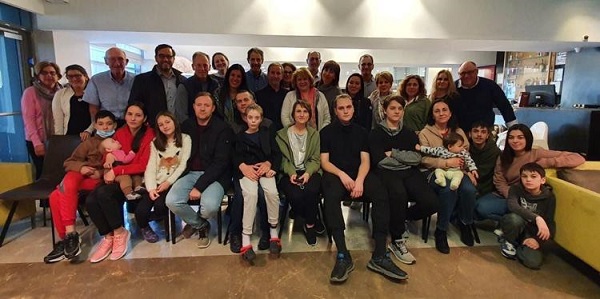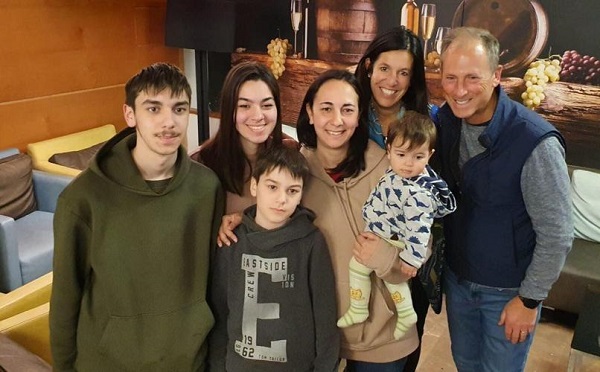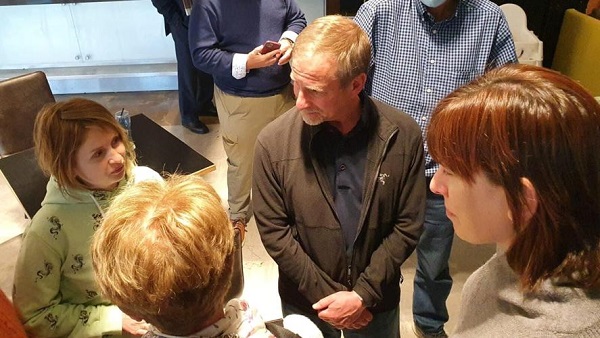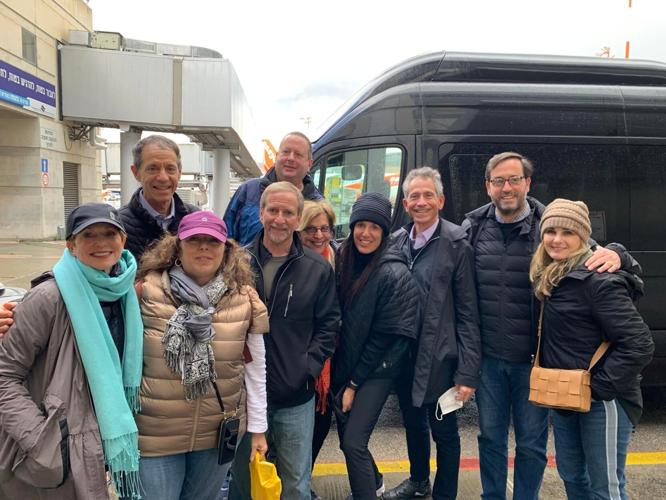04/06/2022
Federation on Front Lines of 'Modern-Day Exodus'
- Share This Story

The Jewish Federation of Cleveland mission participants with members from four families that had just arrived in Israel from Ukraine.
COURTNEY BYRNES | STAFF REPORTER
Article reprinted with permission from Cleveland Jewish News
Following a trip to the Poland-Ukraine border to see the relief efforts, Jewish Federation of Cleveland President Erika B. Rudin-Luria and board chair J. David Heller joined other Cleveland Federation leaders in the United Arab Emirites and Israel for a preplanned mission.
Twenty Clevelanders took part in the trip as they traveled to the UAE for seven days and to Israel for four days, where they met with refugee families in resettlement hotels in Ashdod and at Ben Gurion Airport.
“I was actually on a plane to Israel when Russia first invaded Ukraine at the end of February,” Rudin-Luria told the Cleveland Jewish News.
From the start of the crisis, she could see the efforts of the Federation’s global partners, The Jewish Agency for Israel and the American Jewish Joint Distribution Committee, to mobilize in Israel to respond and help the refugees.
During her trip to Poland with Becky and David Heller, they saw the relief efforts of JAFI and the JDC on the ground to provide rescue and evacuation, as well as humanitarian efforts. Upon returning to Israel, she joined the others in meeting more refugees.
“I feel like we had the opportunity to hear stories at different points along their journey,” Rudin-Luria said. “When we were in Poland, we spent time with people who may have been traveling for a few weeks after they escaped from their home but were really waiting. And in Israel, we met people who obviously were further. They made a decision to make aliyah.”

Becky and J. David Heller, far right, with members of one of the families.
The group met with families in resettlement hotel in Ashdod that had escaped their homes in Ukraine to Warsaw and came to Israel to make aliyah. The new olim live in the hotels for 30 days while they figure out the next step.
Many of the refugees making aliyah are Jewish or have some connection that brought them to Israel.
“We actually heard a few stories that were beautiful of grandchildren and great grandchildren of righteous gentiles – people who are not Jewish, but who saved Jews during the Holocaust – who were evacuated from Ukraine and brought to Israel,” Rudin-Luria said.
Another family, a brother and two sisters from Kherson, was not Jewishly active, but had “Jewish” stamped on their passports and knew that Israel was the safe place to go, Heller told the CJN.
“When they left, they were met up with The Jewish Agency for Israel that brought them to Israel, and they are now in the process of making aliyah,” he said.
As the Federation set up the Ukrainian Emergency Relief Fund at the start of the war, this trip was an opportunity to see how the funds were being spent to help those in need.
“I came away from the trip feeling very good about the donations that our community is receiving,” Heller said. “And I couldn’t recommend anyone else any other organization that could be doing as good a job as The Jewish Agency for Israel and the Joint Distribution Committee are doing on the ground.”
Those on the trip had the opportunity to go to the situation room that the Jewish Agency has in Jerusalem to meet with representatives from JAFI and the JDC to hear about the efforts on the ground, in which they said they were getting tens of thousands of calls daily for people wanting to make aliyah to Israel, Renee Chelm, a former board chair for the Federation, told the CJN.

Reneé Chelm, left, Peter Meisel, and Erika B. Rudin-Luria speak with a woman who had just arrived from Ukraine with her daughter and granddaughter. They had to leave all the men in their family behind.
Chelm, a resident of Pepper Pike and member of Park Synagogue in Pepper Pike and Cleveland Heights, shared stories from meeting families at the hotel in Ashdod and meeting with 110 refugees as they came off a plane at Ben Gurion Airport. Most of them were women, children and elderly people, and they carried all their belongings in a plastic grocery bag. There were also many pets that made the trip from Ukraine to Israel, she said.
At the airport, the refugees were masked, but the look of shock and the trauma they have endured was still visible, and the group did what they could to make them feel welcomed by smiling with their eyes and offering lollipops to the children. By making it to Israel, Chelm said that there was hope for them in the future, symbolized by the rainbow that appeared on that rainy day at the airport.

Reneé Chelm, from left, Greg Marcus, Dara Yanowitz, Peter Meisel, Gary Weiss, Loree Potash, Becky Heller, Stewart Kohl, Jeff Wild and Elisabeth Sherman at the airport to greet new Ukrainian olim arriving in Israel.
“It was such a moving and such a powerful experience as it was a modern-day Exodus,” Chelm said. “It’s like we, as Jewish people, can relate so much to having to flee. We fled constantly our whole existence and this is just one more incident.”
While many Ukrainian refugees have made aliyah to Israel, the aid does not stop there as many only speak their native language and will need help to build a new life in Israel.
“We’re going to need to help them, not just learn the language, but to teach a number of them vocational tools that will help them be in full-time employment in an economy that is new to them,” Jeff Wild, who attended the trip as a lay leader, told the CJN.
Wild, a resident of Beachwood and member of Green Road Synagogue in Beachwood, also met the families at the hotel and in the airport and recalled a few powerful moments from his time with the refugees.
After speaking with four families in Ashdod through an interpreter, he said, “one of the men grabbed me – and like I said, they don’t really speak English – he was able to hug me and to say in English, ‘thank you.’”
That moment brought him to tears to see how the aid and relief efforts were helping these families through a difficult time.
“I’m very glad that I had the opportunity,” Wild said. “Sad that I had to see it, but appreciative of the great work that the Federation is doing with our partners in The Jewish Agency and the Joint Distribution Committee.”

